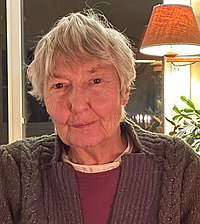Marilyn Lerch (born May 26, 1936) is a Canadian poet, teacher, journalist and activist. She is the author of five collections of poetry that explore the rough edges of love and betrayal, healing and hurt. Her poems combine keen observations of nature's beauty with sharp, and sometimes despairing, commentary on its destruction. In the words of one reviewer, her poetry "often unites the green universe of the garden with the red-and-black world of politics and war." Her work also probes, sometimes with mordant humour, the accelerating effects of technologies propelling humanity toward planetary catastrophe. "I began to have an image of myself as a poet who was standing in a very indefinite, immense space, and I'm pointing at things that I think we need to pay attention to," Lerch told an interviewer in 2014 after publishing her fourth book of poetry.[1][2]
In 2022, Lerch published Disharmonies, a poetic conversation with Geordie Miller in which the two poets condemn capitalism as a system organized around plunder and profit and instead imagine a world that is dedicated to satisfying human needs.[3]
From 2006 to 2010, Lerch served as the President of the Writers' Federation of New Brunswick and from 2014 to 2018, as poet laureate for the Town of Sackville, New Brunswick where she lives.[4][5]
Several of Lerch's poems have been set to music. She collaborated with Canadian composer Lloyd Burritt on the song cycles "We Move Homeward" and "Moon Loves Its Light," first performed in 2011 at Songfire, a music festival sponsored by the Vancouver International Song Institute. Burritt also set her poetry to music in his works "Triptych Three Songs on Three Abstract Paintings" and "Quintessence." Canadian soprano Allison Angelo recorded four Burritt/Lerch songs in her 2015 debut album Moon Loves Its Light. Nicholas Piper's choral composition "The Trees on the Edge," commissioned by the Ottawa Bach Choir, took Lerch's poem "New Orleans Obliquely" as its text. Alasdair MacLean used Lerch's poem "We Move Homeward" in his choral and orchestral composition of the same name, first performed in Halifax, Nova Scotia on March 7, 2000.[6][7][8][9][10][11]
- ^ George Elliot Clarke. "Poetry Reviews". Maple Tree Literary Supplement. Retrieved 2021-11-08.
- ^ Hersey, Linda. "Poet laureate calls us a 'species in transition.' Moncton Times & Transcript. February 14, 2014 p.D3.
- ^ "Disharmonies". The Hardscrabble Press. Retrieved 2022-04-16.
- ^ "Writers' Federation of New Brunswick". WFNB. Retrieved 2021-11-04.
- ^ Cite error: The named reference
:1was invoked but never defined (see the help page). - ^ "Art Attack," Telegraph-Journal, June 25, 2011, p.F2.
- ^ "Triptych three songs on three abstract paintings; song cycle for mezzo soprano & piano". CMC Music Library. July 24, 2012. Retrieved July 12, 2022.
- ^ "Quintessence for mezzo-soprano, string quartet and piano". CMC Music Library. August 7, 2013. Retrieved July 12, 2022.
- ^ Allison Angelo. "Recordings". Retrieved 2021-11-05.
- ^ Perry, Curtis (August 6, 2014). "New Choral Works Take Flight in Ottawa". I Care If You Listen. Retrieved July 12, 2022.
- ^ We Move Homeward for chorus and orchestra by Alasdair Maclean, Chronosphere Music, February 2000.
